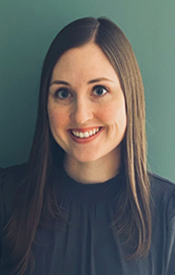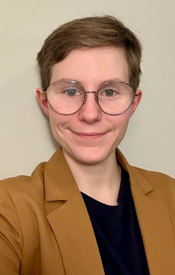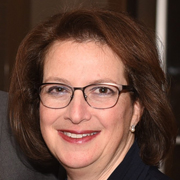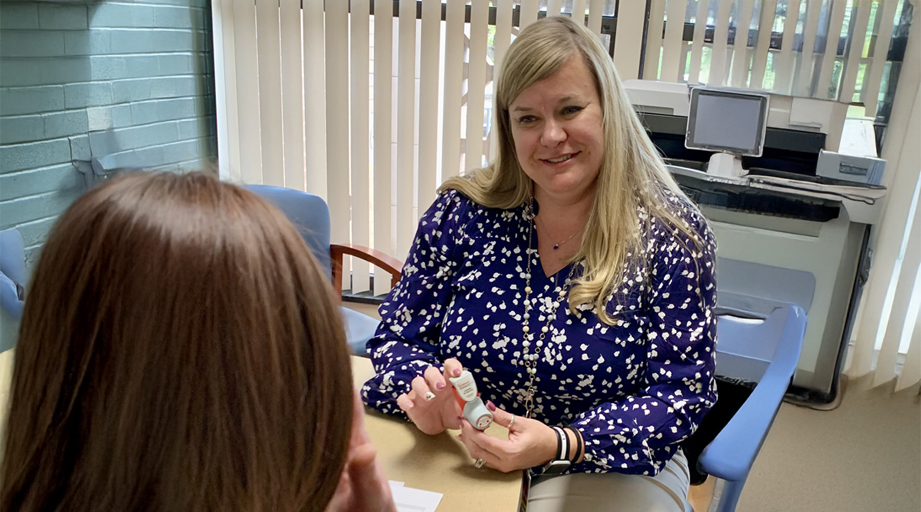
When Lauren Sullivan and a colleague were preparing for a presentation to leaders at Cambridge Health Alliance in Massachusetts on how to get pharmacists up to speed on pharmacogenomics, they came across information about ASHP's Pharmacogenomics Accelerator — a joint program offered by ASHP and the University of Minnesota College of Pharmacy that aims to accelerate the implementation and growth of pharmacy-led pharmacogenomics services in hospitals and health systems.
Sullivan, a clinical pharmacy specialist and clinician informaticist at the health system, said her pharmacy leadership recognized pharmacogenomics as a growing area and one cited by ASHP’s Pharmacy Forecast as a trend to watch.
Pharmacogenomics is a ‘niche area’
“We wanted to be prepared as this becomes more popular in terms of patients asking for pharmacogenomic testing or coming to us with results,” she said, noting that she didn’t get much training on the topic in pharmacy school or during residency.
They promptly applied for the accelerator and participated in the second cohort, using the resources and networking opportunities. “Pharmacogenomics is such a niche area where not all hospitals and institutions are doing it…so having the ability to work with different experts in the area throughout the United States was a big pull.”
The 12-month accelerator supports pharmacists, with the goal of improving the health of millions of patients across the United States by personalizing medication therapies based on individuals’ pharmacogenomic profiles, which can indicate how a person’s genetic attributes might affect their response to certain medications.
The accelerator includes several types of training, including virtual monthly cohort calls that take participants through the steps of implementation science and setting up pharmacogenomics services. The program includes webinars featuring pharmacogenomics case-based learning and coaching sessions that provide direct program support.
Participation in the program also includes access to ASHP’s Pharmacogenomics Certificate worth 19.5 continuing education credits to provide structured didactic training to the institution’s team members.

Behavioral health service
The Cambridge Health Alliance team, which includes clinical pharmacist specialist Caralyn Granato, is looking to start pharmacogenomics testing this August. It will start with behavioral health and then expand to other areas, such as cardiology.
“Some of the psychiatrists were using third-party labs prior to starting this program,” said Granato, who works in a behavioral health clinic. “But what we’ve learned through this program and other resources is that some third-party labs are not always the most accurate. It’s nice to have staff within the organization be able to interpret the results.”
With the help of the accelerator, Sullivan, Granato and colleagues have selected a testing vendor, compiled a plan to present to their pharmacy and therapeutics committee and are planning two education sessions for their psychiatrists: one to explain how pharmacogenomics works and a second to introduce their new service prior to launch.
Because these pharmacists work under a collaborative drug therapy management agreement and can prescribe and order labs, “the hope is that we would be the ones that are ordering [tests], interpreting results and then also able to change patient’s medications based on [results],” Sullivan said.
Sullivan and Granato say they appreciate the resources provided by program leaders, such as a practice management assessment tool that breaks down the build of a pharmacogenomics program into aspects needed in clinical and informatics areas, and more, to help track progress.
“They provide a very good support network, and they’re also very available outside our monthly cohort meetings,” Sullivan said. “If we have any questions or concerns, or we’re struggling with an area, we can reach out to them and then be directed to the right person to help.”
That support plus meetings ensures the work isn’t falling to the wayside of another project, she noted. “We’re really staying on track of getting this launched,” said Sullivan.
Pharmacogenomics testing support
Another participant in this year’s cohort is WellSpan Health in York, Pennsylvania, where pharmacists realized through the program that they should hire a dedicated pharmacogenomics pharmacist to direct implementation of pharmacogenomics testing.

Kate Cummins, who had experience as the first pharmacogenomics resident at the Mayo Clinic, began work earlier this year and quickly got up to speed. She worked with the team to find one standardized testing vendor to cover pharmacogenomics testing for a variety of disease states.
Now, they’re starting to identify patients who would benefit from testing and talking to providers focused on behavioral health and cardiology. The idea is to roll out testing in these two areas in their eight hospitals across Central Pennsylvania and over 220 patient care centers.
Leaders with the accelerator have provided Cummins and colleagues with resources they didn’t anticipate needing and helped them think outside the box on how to justify certain aspects of the program to health system leadership, Cummins said. With the help of the cohort, “I’m very confident that we’ll be able to have a successful program,” she said.
Accelerator provides access
“One of the things that I really like about this accelerator is the access to these other groups that are going through the same phases that we are, so we can bounce ideas off of each other, and share different tools, tips, tricks in the literature that we find,” she said. “That’s been very, very helpful in a lot of the conversations we’ve had internally.”
The dedicated coach has been a “fantastic” addition, Cummins added. “We’ve been able to meet with her whenever we needed to,” she said. “Anytime I have any questions, I feel more than comfortable reaching out. She’s even been able to help make connections with people outside of this current cohort, and that has been super helpful for us.”
Cummins said she would highly recommend the program to other pharmacists. “For a healthcare system or anybody wanting to implement pharmacogenomics that doesn’t know where to begin, it’s a great jumping-off point,” she said. “You get access to experts that have already implemented programs and you get access to other healthcare systems that are going through the same thing as you, so that you can make your implementation successful.”
Granato agreed. “It’s a really nice balance between learning on your own time and also having those monthly meetings for accountability,” she said. It helped her team move ahead more quickly than they would otherwise be able to.
Once in the program, make use of your connections. Cummins stressed, “Do not be afraid to reach out to people in the cohorts. That’s something I wish I would have done a little bit sooner, because there were a couple of sites that are showing some of their justifications pretty closely to how we need to be showing some of ours.”
If your site is interested in joining the third accelerator cohort, which starts this fall, email [email protected] or visit the Pharmacogenomics Accelerator program for more information.








